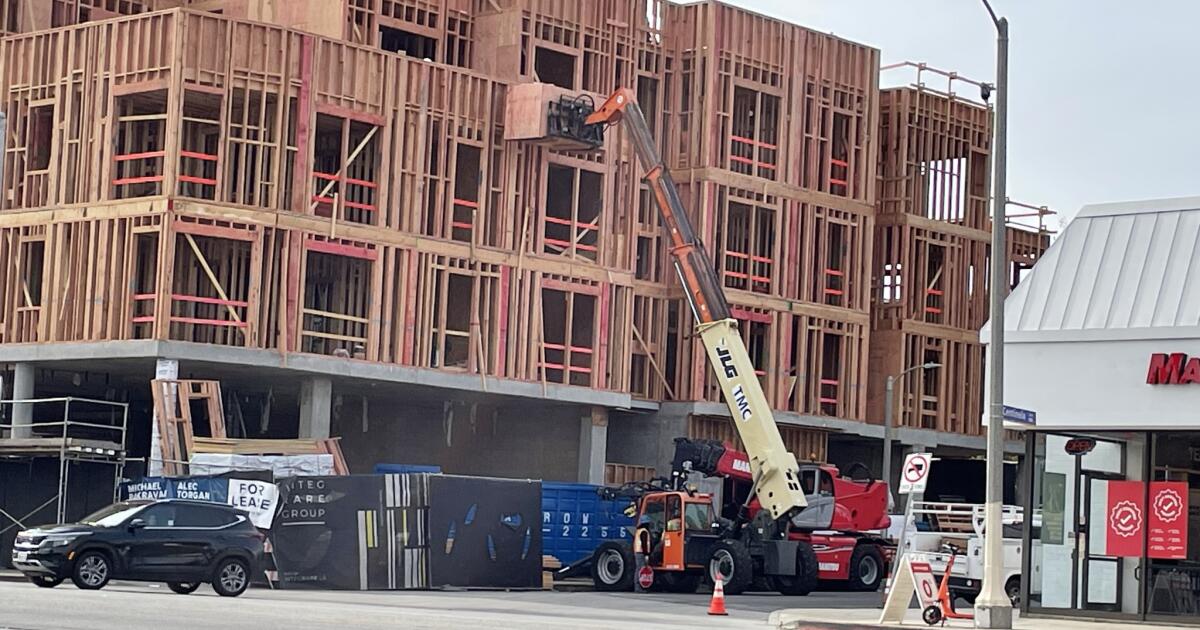A key Los Angeles City Council committee signed off on a sweeping rezoning plan Tuesday that would focus new market rate and affordable housing on commercial corridors and in existing dense residential neighborhoods.
The effort is in response to state housing mandates that seek to alleviate the housing crisis by requiring the city find land where an additional 255,000 homes can be built and have the plan in place by mid-February.
In hours of public comment, members of the Planning and Land Use Management Committee committee heard from Angelenos who wanted to preserve single family neighborhoods and those who wanted to open the areas up to more development to reduce economic and racial segregation.
“We need affordable housing everywhere — in every neighborhood,” said Maria Patiño Gutierrez, a policy director with the nonprofit Strategic Actions for a Just Economy.
Patricia Carroll, a resident of St. Andrews Square in central L.A., told the committee that though she lives in a multifamily area, she enjoys walking through nearby neighborhoods filled with single family houses, grass and trees.
“If this was to disappear … L.A. would be a very sad place to live,” Carroll said.
In the end, the committee voted 4 to 0 to approve a recommendation from the City Planning Commission that largely leaves single family zones alone.
The proposal can still be modified by the full City Council and some council members not on the PLUM committee have expressed interest in shifting course when it comes to single-family zones.
“By opening up some of these neighborhoods — to some new housing — we would actually be making steps towards undoing the city’s patterns of segregation that in many cases policymakers imposed upon this city,” Councilmember Nithya Raman told the committee.
As now written, the proposed Citywide Housing Incentive program would enable developers to build more than currently allowed in commercial zones and in residential neighborhoods where apartment buildings are already allowed. In order to do so, developers would need to include a certain percentage of affordable units — and the property must be near transit or along a major street near jobs and good schools.
Projects that are 100% affordable would be eligible for incentives across a wider swath of the city.
The incentives would apply in single-family zones only if a property is owned by a public agency or a faith-based organization, which accounts for just a sliver of the city’s single-family lots.
Some tenant advocates feared that by opening up existing multifamily areas to significant new development, it would cause a wave of displacement as existing buildings are knocked down.
These advocates called for imposing further restrictions on demolition, which the Planning Department said could significantly reduce new housing construction, including units that are mandated to be affordable to low-income households.
The PLUM committee did not adopt those additional restrictions, but recommended calling for a report to study them.
In a letter to city officials, the California Department of Housing & Community Development warned such additional restrictions could put the city out of compliance with state housing law.
The PLUM committee, however, did make some changes despite such warnings.
The committee passed an amendment that would reduce the number of homes per lot faith-based organizations would be allowed to build under its program.
The Western Regional Council of Carpenters, along with some council members, have expressed concerns that faith-based organizations constructing housing would choose to use the city incentive program, which does would not mandate union-level wages, instead of using a new state law that gives nonprofit colleges and faith organizations building incentives if they pay such wages.
“We can not solve the housing crisis by driving construction workers into poverty,” carpenter Nicolas Reyes told committee members.
Brooke Wirtschafter, director of community organizing with the Jewish congregation IKAR, told the committee that IKAR is looking to build affordable housing with as many as 78 units.
She urged the city to keep its faith-based proposal as originally proposed, because doing so would create “more opportunities for congregations to build housing, especially in high-resource communities.”

